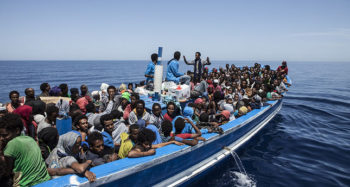
Everyday, thousands of African migrates attempt to cross the Mediterranean Sea into Europe in search of the proverbial greener pasture.
Usually, scores of these migrants lose their lives in the course of the journey.
In February, some survivors rescued off the Libyan coast by the Italian Coast Guard gave harrowing accounts of small boats packed with migrants that were overwhelmed by high waves, which washed scores of people overboard to their deaths in cold Mediterranean waters.
Reports claimed that more than 300 people might already have died by the time coast guard vessels reached the scene. An additional 29 out of over 2,000 rescued later died of hypothermia before the rescue vessels could reach port.
More than 200,000 people were rescued and more than 3,000 reported to have died in unsafe, irregular and illegal sea passages on the Mediterranean during 2016.
Italy is usually the first destination of these migrants, from where they find their ways into other countries in Europe in search of the so-called good life.
Cartels and people smugglers who care little about the lives of their victims are cashing in on the illegal business of transporting people across the sea in overcrowded rickety boats. These smugglers, profiting from other people’s misfortune, are usually indifferent to their suffering and in some cases are the cause of the misfortunes.
According to the International Maritime Organisation (IMO), people have the human right to migrate. But it is time to stop illegal, unregulated passage arranged by people smugglers.
“Not only do they put the lives of the migrants in danger, they also endanger the rescue services and merchant shipping which take part in the rescue operations. Something needs to be done against the smugglers or the situation will not improve. It is placing an intolerable strain on rescue services and on merchant vessels,” IMO said.
We cannot but agree with this position. A collective global action is needed to end people smuggling business. But more importantly, African leaders must wake up to their responsibilities of providing comfort for their people at home. Many who dared to undertake the extremely dangerous journey across the Mediterranean Sea did so to escape harsh living conditions at home.
In terms of natural resources, Africa is the world’s richest continent. It has 50% of the world’s gold, most of the world’s diamonds and chromium, 90% of the world’s cobalt, 40% of the world’s hydroelectric potentials, 65% of the manganese, millions of acres of untitled farmland and enormous crude oil and natural gas reserves.
Despite these vast resources, the bulk of African people live in poverty. African leadership struggles to stimulate and retain it strongest resource — the people, who either live in unnecessary frustration, hopelessness and poverty, die of preventable disease, or run to the West to gain appreciation.
It is time to change Africa’s leadership woes and begin to use its resources for the good of its people. The myopic, selfish and backward type of non-progressive leaders that have ruled the African continent for decades must now give way to a new order. This is one sure way of checking the tendency for a perilous journey across the Mediterranean.
Copyright Ships & Ports Ltd. Permission to use quotations from this article is granted subject to appropriate credit given to www.shipsandports.com.ng as the source.
